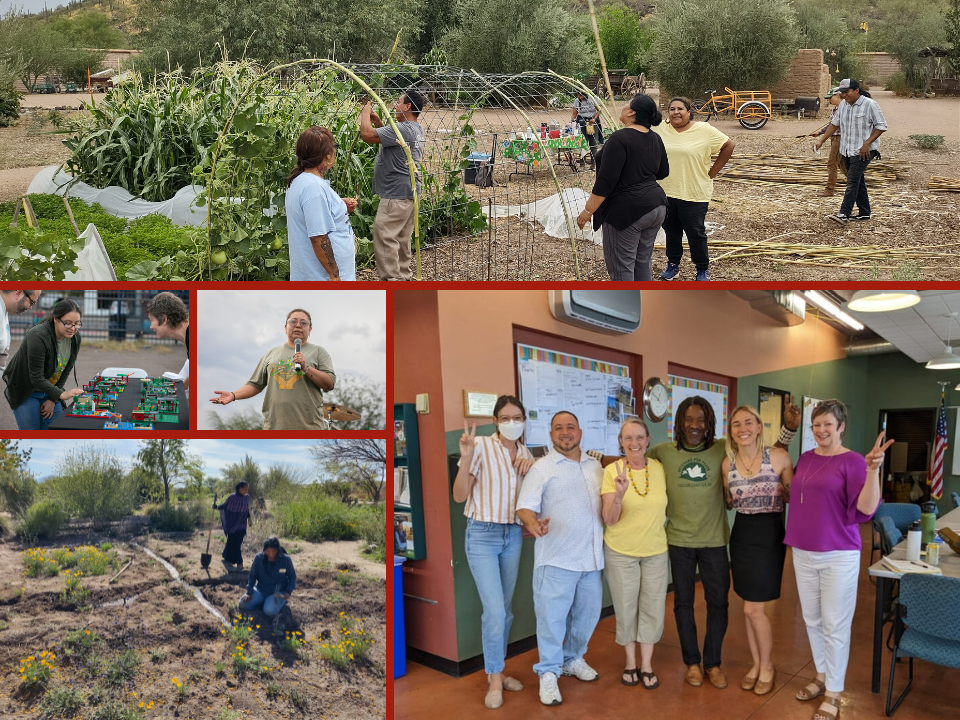In partnership with United Way of Tucson and Southern Arizona, the Community Foundation for Southern Arizona (CFSA) is pleased to announce that a total of $60,000, renewable for three years, has been granted to three local organizations to support the development of local Southern Arizona neighborhoods. Funding for these multi-year grants comes from the Pro-Neighborhoods Endowment Fund, an endowed fund held at the Community Foundation for Southern Arizona.
Pro-Neighborhoods Grants have been awarded to Friends of Tucson’s Birthplace Mission Garden, The Nonviolence Legacy Program, and Southwest Folklife Alliance. The organizations will receive annual funding through 2025 to support their work within the Amphi, Menlo Park, and La Doce neighborhoods.
Jeaiza Quiñones Ivory, Director of Community Impact at CFSA, shared, “We’re excited and hopeful for the communities that will benefit from funding through the Pro-Neighborhoods Endowment Fund.” She continued, “The work being done by these three nonprofits is insightful, collaborative, and will create a substantial impact. I’m also thrilled to see another round of multi-year grants awarded, allowing our nonprofits to think long-term and work flexibly to address community needs.”
The Pro-Neighborhoods Endowment Fund was initially conceived through a collaboration between CFSA, United Way of Tucson and Southern Arizona, Pima County, and the City of Tucson. The partnership was established in 1999 to:
- Increase individual and neighborhood participation in community planning and problem-solving.
- Support projects that demonstrate and encourage individual, family, and grassroots initiative and responsibility.
- Enable individuals to build on strengths rather than institutionalizing needs so that they are participants rather than recipients.
- Help identify and utilize existing resources and promote efforts that bridge racial, ethnic, generational, and economic boundaries.
“United Way of Tucson and Southern Arizona is encouraged by the Pro-Neighborhood Fund that will help local nonprofits bridge racial, ethnic, generational, and economic boundaries by directly supporting local communities in planning and problem-solving,” shared Jessica Novak, Senior Director of Community Development Special Projects at United Way of Tucson and Southern Arizona.
“We are deeply grateful to be awarded the Pro-Neighborhoods Grant. It will help Mission Garden preserve and share traditional agricultural knowledge and skills,” said Dena Cowan, Mission Garden’s Curator. “The educational programs the grant supports are conceived especially for residents of the surrounding neighborhoods and members of the cultural groups related to our local heritage. These programs are the heart of our Garden, as they fulfill our main purpose of enriching the community by strengthening connections to our history, nature, and culture.”
“OPCS is excited to partner with the Amphi Panteras Tenant Empowerment Program. This generous funding will improve the quality of life for Amphi Neighborhood tenants by ensuring they receive prompt repairs and improvements to substandard multifamily housing units,” said Tom Litwicki, CEO of Old Pueblo Community Services, where the Nonviolence Legacy Program is housed. “Renters have a right to quality housing and safe neighborhoods. The Panteras program helps them gain these rights.”
Leia Maahs, Executive Director of Southwest Folklife Alliance, shared, “This grant helps Southwest Folklife Alliance invest in members of Tucson’s Southside to formalize Tucson’s FIRST Community Land Trust policy based on solidarity economy and cultural organizing. The eight fellowships made possible by Pro-Neighborhoods funding will support intergenerational members of Regeneración as they develop community-led design strategies, articles of incorporation, and a governance system for one of Tucson’s first heritage-based Community Land Trust model projects on South 12th Ave., also known as La Doce.”
Maahs continued, “The grant will impact residents’ ability to make policy and sustainable land acquisition to create community land ownership that fosters relationship building, sustainable cultural practices, and positive change in their community. Using folklife as a tool for cultural organizing, intergenerational residents can harness their heritage as a key asset in sustainable design, social equity, and entrepreneurship.”

